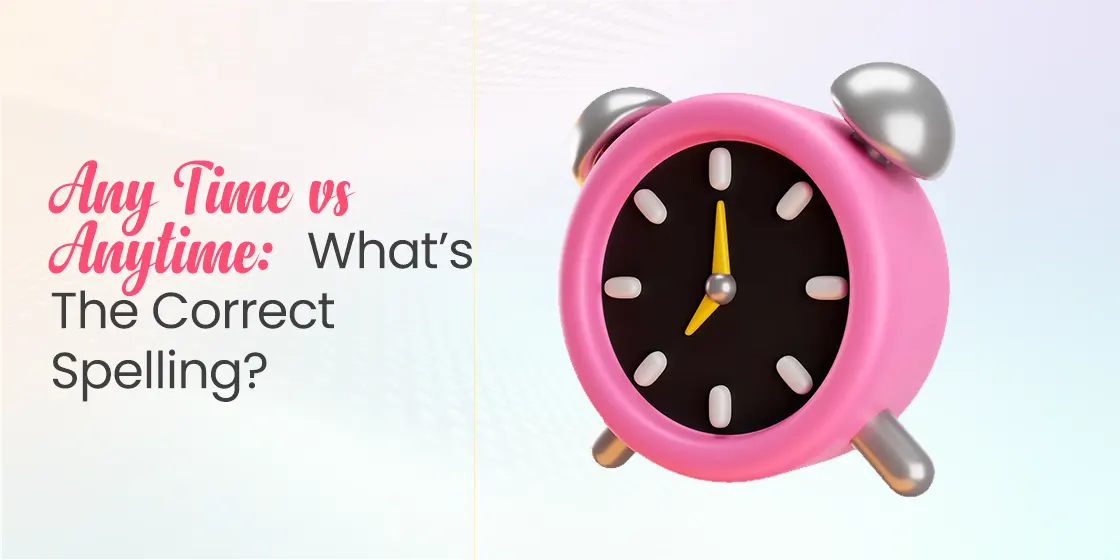Table of Content
Anytime or Any time – Know Which Spelling Type is More Accurate
Have you ever paused mid-sentence, fingers hovering over your keyboard, unsure whether a certain word should be one word or two? The English language is full of such tricky pairs. It contains words that can exist either as a single compound or as two separate words, each form carrying slightly different meanings or usages. It’s a subtle nuance that often slips past even the most attentive writers, leading to sentences that might look correct at first glance but feel just a little off.
A perfect example of this linguistic puzzle is any time v anytime. While they might sound identical when spoken, the choice between the two in writing can shape the rhythm and precision of your sentence. Anytime usually acts as an adverb, meaning “whenever” or “at any time”, while any time as two words more often refers to a specific amount or concept of time. Understanding when to merge these words and when to keep them apart can sharpen your copywriting services and prevent subtle errors.
This blog post will dive into the fascinating world of such word pairs, using any time and anytime as our core example. We’ll clarify the rules and provide simple tips to help you choose the right form in your writing. So, if you’ve ever wondered whether it’s alright or all right to combine your words, you’re in the right place.
Any time vs Anytime: What’s the Difference?

The phrase any time is a simple and clear noun phrase, made up of the adjective any and the noun time. It refers quite literally to an amount or span of time, without specifying exactly when that time might be. In contexts like this, any time remains two separate words, functioning as a noun phrase that fits into sentences just like other time-related expressions such as some time or enough time.
On the other hand, anytime as one word serves a different grammatical role altogether. It’s an adverb, meaning it describes when something can or might happen. Used this way, anytime generally means “whenever” or “at any point in time” and it doesn’t specify a precise time frame. For instance, if you say, “You’re welcome to visit anytime,” you’re telling someone that they are welcome to visit whenever they wish. As an adverb, anytime can slide into sentences just as easily as other adverbs like often or soon.
Understanding the difference between any time and anytime helps avoid subtle errors in writing and speaking. If you’re referring to a measurable or specific chunk of time, it’s usually correct to keep the words separate. However, if you mean something can happen at no particular moment, merging them into the single word anytime is the right choice. Mastering this distinction not only improves clarity but also polishes your overall digital copywriting.
When to Use Any time or Anytime?

The word anytime functions as an adverb and can often be swapped into sentences where you might otherwise use the word whenever. This means it describes the timing of an action in a general, non-specific way. For example, if someone says, “Call me anytime”, they mean you are welcome to call whenever it’s convenient for you. It’s a flexible word that fits naturally into places where you want to convey openness or an ongoing possibility.
In contrast, the noun phrase any time has a more precise grammatical role. One of the most common places where you’ll see any time used as two words is after the preposition at. Any time basically acts as the object of the preposition at, forming a phrase that refers to a quantity or period rather than a vague point in time. Keeping these words separate is key when you’re discussing time as a noun rather than using it to describe when something could occur.
Understanding when to use anytime as one word versus any time as two words can help keep your brand copywriting precise and grammatically sound. A helpful tip is to check whether the word is replacing whenever or fitting into a spot where you’d usually find an adverb. But if the phrase follows a preposition like at or refers to a specific duration or amount of time, it’s best to write it as any time. This small but important distinction ensures that your meaning is clear in all types of scenarios.
Examples of Using Any time
To better understand how the above theory works, it is better to look at some examples that defines the correct method of using any time. Here’s how any time can be used in sentences:
- Do you have any time to meet this afternoon?
- I don’t think I’ll have any time for vacation this year.
- She hardly has any time to relax these days.
- Let me know if you find any time in your schedule.
- He didn’t spend any time to prepare for the meeting.
- Is there any time left before the train leaves?
- I can’t promise I’ll have any time to help you tomorrow.
- They didn’t waste any time starting the project.
- We didn’t get any time to discuss the details.
- Do you have any time available next week?
- She couldn’t spare any time for her hobbies last month.
- He didn’t give me any time to explain my side of the story.
- I wish I had any time to pick up a new skill.
- We didn’t have any time to enjoy the scenery on our trip.
- Is there any time that works better for you?
Examples of Using Anytime
Just like any time, many people also do not know how to use anytime in the sentences. If you are also confused how to use latter in the sentences, take a look at these examples to clear your concepts.
- You’re welcome to drop by anytime.
- Call me anytime if you need help.
- I’m free to chat anytime today.
- You can visit the website anytime for updates.
- She’s ready to travel anytime the opportunity comes up.
- Text me anytime you have a question.
- He said he’d be available anytime this week.
- Feel free to reach out anytime.
- The store is open anytime during business hours.
- I’d love to hang out anytime you’re free.
- You can start the project anytime you like.
- Let me know anytime you want to practice.
- They’re prepared to leave anytime necessary.
- The app lets you check your balance anytime.
- She’s willing to help out the workers anytime it’s needed.
Frequently Asked Questions
| When should I use anytime? Use anytime as one word when you mean “whenever” or “at any moment” acting as an adverb. It fits where you could substitute whenever like in “Call me anytime”. |
| When should I use any time? You can use any time as two words when referring to an amount or specific period of time, usually as a noun phrase. |
| Is it call me anytime or any time? “Call me anytime” is correct because anytime acts as an adverb meaning whenever. It is therefore recommended to use the one-word form in this context. |
Final Words
That sums up our entire blog in which we have discussed key differences between any time vs anytime. Both of these spelling versions are correct, however, they are used in precise scenarios as per the background context. As a writer, you need to know about these practices because they can enhance your professional writing skills. This article is therefore written to let you know how these two spellings should be used as per the requirements of the sentence. By understanding the correct way, you’ll become well-versed with all types of similar positive words that often come with two spellings.

Unleash your brand story`s potential with eContentSol – your creative writing companion. We craft narratives that captivate. Ready to elevate your content game? Dive into creativity with us and let`s bring your ideas to life.


